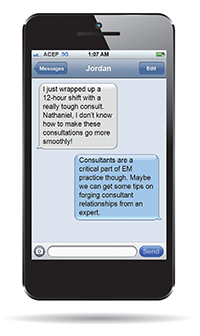
Explore This Issue
ACEP Now: Vol 34 – No 04 – April 2015In the course of every provider’s medical career, there is a certainty that we all have to face: the challenge of managing a relationship with a difficult consultant. This also begs a broader question: how do you forge a good working relationship with consultants in general? There are several proven methods to successfully accomplish this.
1. You need to better understand their world. Take every opportunity to learn and appreciate their workload, schedule, and career demands. The easiest way to do that is to simply round on them from time to time. Spending a few informal minutes “off the clock” talking with consultants about their lives, careers, or interests can facilitate the start of great professional relationships. Ask them how their day or week is going. Ask them what makes their work challenging or difficult, and apply their answers to internally asking yourself what you can do to minimize these stated challenges. Ideally, do this when you aren’t asking anything from them.
2. Once you have a better understanding of them, use this knowledge to ask what mutual expectations both of you may have that will result in a good working relationship. Inquire what you can do to optimize the collaboration, efficiency, and transfer of care to them. It is as simple as inquiring, “As I consult you from time to time, what can I do optimize our working relationship and to make it easier and more efficient for you to complete your consult? My goal is to always provide you with a high-quality handoff, and I would like to know, from your perspective, how I can consistently achieve that.” This type of conversation inevitably promotes great mutual respect.

Nathaniel Mann, MD, is a resident in the department of emergency medicine at the University of Cincinnati in Ohio. Jordan Celeste, MD, is president of the Emergency Medicine Residents’ Association and an emergency physician in Florida.
3. Take the time to thank consultants on a regular basis. By making them feel appreciated for their time, efforts, and contributions, you openly acknowledge their value and expertise. An example might be, “I want to take a moment to thank you for being a valued resource and colleague to me. I appreciate your expertise, passion for great patient care, and commitment to quality. I acknowledge how stressful and difficult your day can be, and I want to express my appreciation for the support and expertise that you provide to me.” Even the most cantankerous consultants will warm their demeanor when faced with persistent praise and appreciation.
Pages: 1 2 | Single Page





No Responses to “5 Tips to Build Good Working Relationships with Medical Consultants”